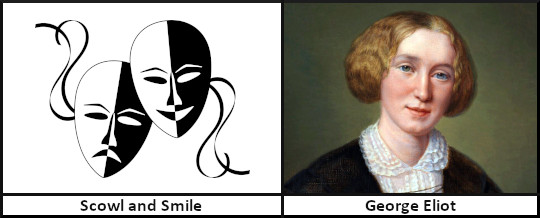George Eliot? Mary Ann Evans? F. O. Hamilton? Lillie Langtry? Apocryphal?

Question for Quote Investigator: The following adage encourages sociability and the projection of happiness:
Wear a smile and have friends; wear a scowl and have wrinkles.
This statement has been credited to George Eliot, a popular Victorian era novelist whose real name was Mary Ann Evans. I am skeptical of this ascription because I have been unable to find a solid citation. What do you think?
Reply from Quote Investigator: QI has found no substantive evidence that George Eliot who died in 1880 spoke or wrote this quotation. The earliest close match located by QI appeared in a 1938 article about friendship by F. O. Hamilton. The statement was adjacent to a remark attributed to George Eliot. Shortly afterward the two statements from the essay were quoted together, and both were mistakenly attributed to Eliot. The details are given further below.
The notion that smiling will help a person to gain friends has a long history. In 1871 a newspaper in Yorkville, South Carolina printed the following. Emphasis added to excerpts by QI:1
It is just as easy to smile as it is to frown. A smile will make you friends, and a frown will make you enemies.
The above statement partially matched the quotation, but it referred to frowning instead of scowling.
Continue reading “Quote Origin: Wear a Smile and Have Friends; Wear a Scowl and Have Wrinkles”







